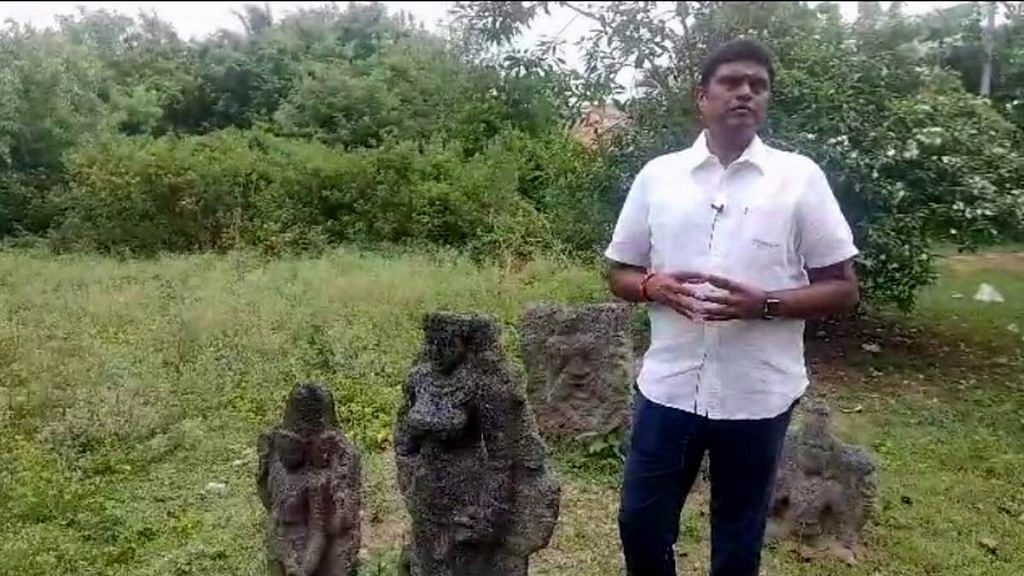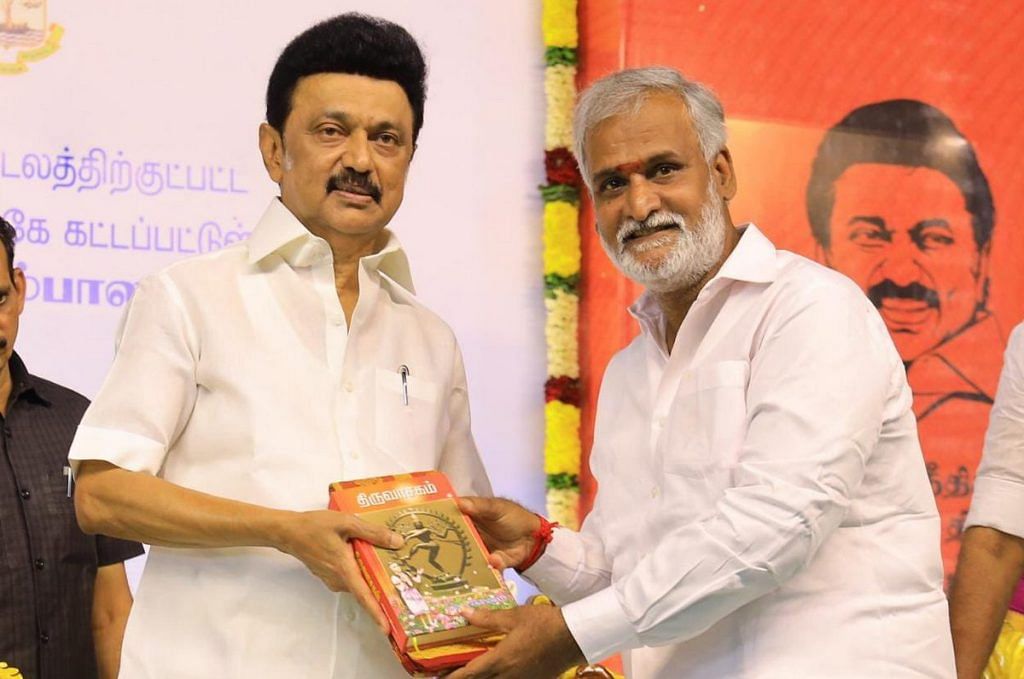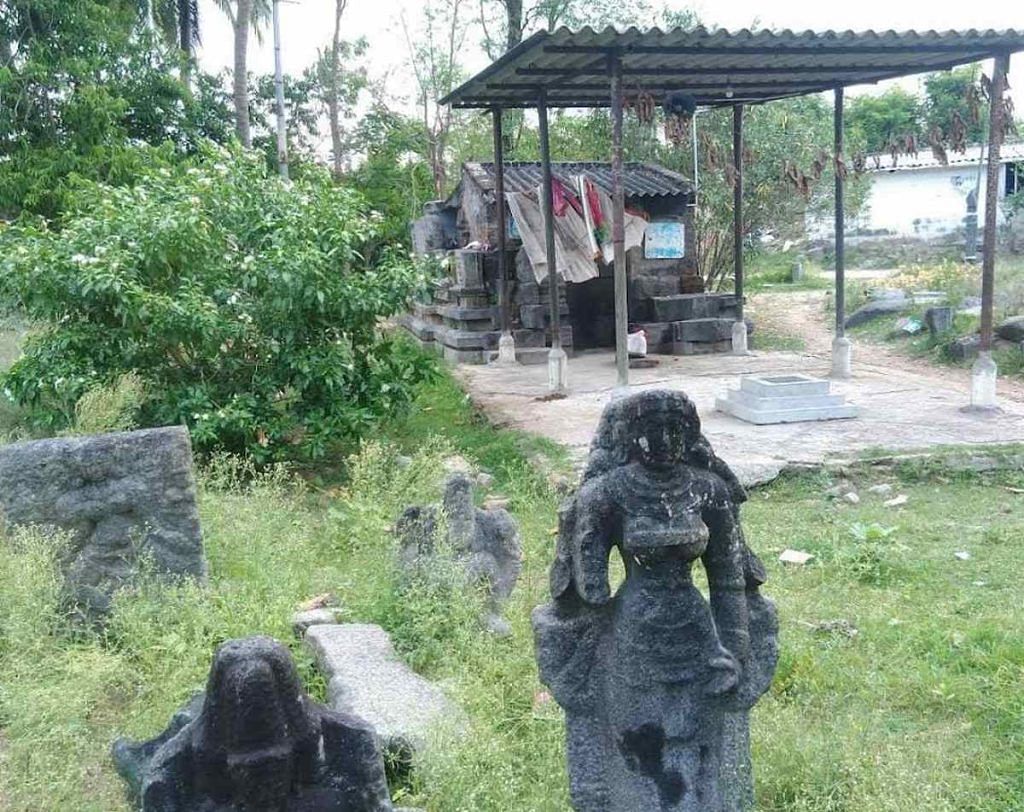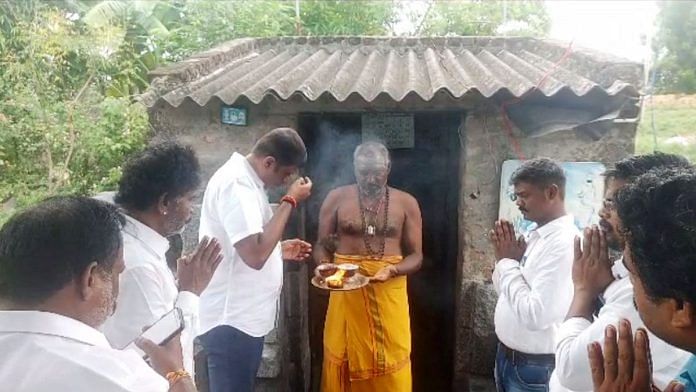Chennai: It’s approximately 11.30 am and a team of the Tamil Nadu BJP’s newly minted spiritual and temple development wing has plunged into the day’s mission: shedding light on the alleged mismanagement and “looting” of temples in the state.
This scorching Monday, the team, led by M. Nachiappan, state president of the temple cell, takes ThePrint on a tour of the Athiswaran temple in Sirudamur village, Chengalpattu district. Ancient sculptures, said to date from the Pallava and Chola eras, dot the site, while the shrine dedicated to Lord Shiva remains in a state of disrepair.
“This is a 900-year-old temple, but there is no mention of it in the village records, district administration, or the Hindu Religious and Charitable Endowment Board (HR&CE) record,” Nachiappan claims.
“It’s a scientific way of looting the wealth of the temple. You will erase the temple from all the documents, then you can take away all the land, right?” he adds.
In Tamil Nadu, a new kind of political battle is underway, with the BJP seeking to make inroads by harnessing the power of temples.
The party’s spiritual and temple development wing, formed about 1.5 years ago, has been at loggerheads with the Dravida Munnetra Kazhagam (DMK) government’s Hindu Religious and Charitable Endowment (HR&CE) Department, which is responsible for the administration, regulation, and management of temples in the state.
While the BJP’s spiritual cell has accused the HR&CE department of neglecting temple maintenance, the clash reflects a larger ideological struggle.
The Dravidian parties that have ruled the state for the last five decades are based on a rationalist ideology and have largely kept religion out of the political discourse, but the BJP is positioning itself as the protector of Hinduism
“The BJP is developing the party by projecting temples as their base. They are doing politics based on devotion, spirituality, and gods,” Chennai-based political analyst Priyan Srinivasan tells ThePrint.
The party has been consistent in following this strategy over the last few years, with a notable example being the massive Vel Yatra led by former BJP state president and current Minister of State for Information and Broadcasting, L Murugan, in 2020. The yatra covered Lord Muruga’s arupadai veedu (six abodes) across the state.
Current BJP president K. Annamalai continued the momentum by championing causes such as the lifting of the ban on pattina pravesam (a tradition involving devotees carrying the seer of Dharmapuram Adheenam in a palanquin), criticising the DMK government for ‘interfering’ in how pothu dikshitars (custodian-priests) run the Nataraja Temple in Chidambaram, and firmly opposing the HR&CE department.
Asked about the BJP’s allegations over mismanagement and interference, HR&CE Minister P.K. Sekar Babu tells ThePrint that the DMK was trying to bring more transparency into the running of temples.
“If shortcomings are identified and reported we ensure that it is rectified. If someone has ulterior motives and keeps complaining we are not bothered about it,” he says.
Also Read: Tamil Nadu’s temple entry problem is spreading: Gounders, Thevars say ‘our god our temple’
‘Protecting temples, Hindu culture’
The BJP’s spiritual and temple development wing was formed last year in response to an increasing number of complaints related to temples being sent to Annamalai, according to Nachiappan.
He claims the BJP was receiving as many as 3,000 such complaints each month.
The party’s specific goal for the wing is to protect “Hindus, temples, and Hindu culture”, which are in threat of being “broken”, he adds.
Under the leadership of Nachiappan, the BJP’s spiritual and temple development wing comprises 12 state secretaries, five vice presidents, 38 district presidents, and other members. To date, the wing has organised more than 12 agitations in the state, all related to temple issues.
The team is also planning to launch an app that can be used by devotees to register their complaints regarding temples.
“This app will allow people to upload a video or photo from the temple with their concerns. Once the complaint is uploaded, the app will ensure that the complaint is directed to the concerned district official,” says Nachiappan.

The larger aim of the wing is to “free” temples from the control of the government, but analysts question how feasible this is.
“Hindu temples are a big source of revenue to the respective state governments. When they say they want to free temples from the state’s control they should also give an alternative plan. Who do they want the temples to be governed by?” asks J.V.C Sriram, author and political analyst.
Temple cell vs HR&CE dept
Ever since its inception, the BJP’s temple cell has been battling with the state’s Hindu Religious and Charitable Endowment department.
For instance, in January this year, the cell staged a hunger strike in Chennai, decrying the alleged “anti-Hindu” nature of the DMK and the HR&CE department.
More recently, on 3 July, Nachiappan lodged a petition with HR&CE department commissioner K V Muralidharan, demanding the withdrawal of a government order (GO) that said all devotees had the right to worship at the kanagasabai mandapam (golden platform) of the Chidambaram Nataraja temple.
The order from the HR&CE department came after the temple’s pothu dikshitars — hereditary custodians-cum-priests — put up a board forbidding devotees from offering prayers on the platform during a four-day festival, citing security reasons. A row over government interference was set off when HR&CE officials removed the board and deployed police personnel to ensure that devotees could pray freely at the temple.
HR&CE Minister Sekar Babu, however, says that the department intervened for good reasons.

“If the operations in the temple are done properly without any disturbance to the devotees, we will not interfere. If the dikshitars exceed limits and violate the regulations, the department has all rights to interfere and we will definitely interfere,” he tells ThePrint.
Nachiappan, meanwhile, alleges that the HR&CE is run by “atheists” who have no emotional connection with temples and are concerned only with appropriating their wealth.
“It is only natural for a party like the BJP to establish a spiritual and temple development wing. In Tamil Nadu, there are 45,000 temples listed under the HR&CE, and over 30,000 temples run privately. The HR&CE fails to adequately maintain the temples under its jurisdiction and simultaneously disrupts the functioning of private temples,” he claims.
Minister Babu dismisses such allegations. “Our work is to ensure that the assets of the gods are for gods, and to make sure that the devotees have all the facilities and a conducive environment,” he says.
According to analyst Priyan, there has been more transparency in the running of temples since the DMK formed government in 2021.
“After the DMK came to power, the temple administration has become transparent. Now, the accounts and property details are shared online,” he says.
In April this year, Sekar Babu informed the state assembly that the HR&CE department had recovered Rs 4,236 crore worth of encroached land from 502 religious institutions.
Speaking to ThePrint on condition of anonymity, a retired HR&CE official says that temple revenue allocation to the department varies from 4 to 12 per cent, depending on the temple’s income.
According to him, the department sets aside some funds for temples’ administration and renovation. The rest, he claims, is “used to pay salaries of the employees of the temple and is not put into the state’s coffers”.
Also Read: DMK reasserting itself or still ‘anti-Hindu’? Tamil Nadu temple reforms spark political question
Athiswaran to Palani— a push for temple causes
At Sirudamur, the temple’s priest Ravi Balakrishnan takes visitors around the site, cutting the overgrown plants and pouring water on stone inscriptions to make them stand out more clearly. He says the carvings date back to the Chola era.
Notably, in a 2002 book called Varalaru Thatayam (Historical Inscriptions), Natana Kasinathan, a former director of the Tamil Nadu archeological department, had written about the stone inscriptions found in the temple. He had described the temple as being more than 800 years old, dating back to the reign of Vikrama Chola.
Priest Balakrishnan says his efforts to get official recognition for Athiswaran temple go back decades.
“From the year 2000 onwards, I have been approaching different officials, right from the village officer till the Chief Minister’s office, to get this temple recognised,” he says.

When these attempts failed to get the desired result, Balakrishnan says he brought the condition of the temple to the notice of the BJP about three months ago.
Upon receiving Balakrishnan’s submissions, Nachiappan assigned the task of looking into the claims about Athiswaran temple to B.G. Rangaswami, the state secretary of the BJP temple cell.
“When we came here, we found the inscriptions. Our research also pointed us to the writing of Natana Kasinathan. We have taken up steps to approach government officials to get the temple recognised,” says Rangaswami.
Nachiappan adds that the party hopes to restore the temple within a year and to dedicate it to the community.
ThePrint tried to contact Chengalpattu district collector A.R. Rahul Nadh over the phone for a comment on the status of the Athiswaran temple, but did not receive a response.
Earlier this year, claims Nachiappan, the BJP’s temple cell notched its first big success after lobbying for the kumbabishekam (consecration ceremony) of the Palani temple, one of the six abodes of Lord Muruga.
“The Palani temple, one of the biggest revenue-generating temples in the state, did not have its kumbabishekam for 17 long years. After receiving a representation about this issue, we immediately approached the HR&CE department and got the process rolling,” he says.
Last December, the HR&CE department had announced an allocation of Rs 16 crore for the grand ceremony, which finally took place on 27 January this year.
A place for ‘soft Hindutva’?
The Justice Party government of Madras presidency in colonial India had brought about the Madras Hindu and Religious Endowments Act, in 1926. This legislation was formulated due to the several exclusionary practices that were followed in temples, and ensured that all sections of the society got access to temples.
However, temples still become contested territories on occasion in Tamil Nadu. In the last six months, there have been at least five instances where people belonging to the Scheduled Castes were either denied entry into Hindu temples or had to enter by force, leading to criticism about the way certain temples are run.
But though the BJP is trying to steer the narrative on Hindu places of worship, its reach is still limited in Tamil Nadu.
In the 2021 state assembly polls in Tamil Nadu, the BJP in alliance with the AIADMK was able to secure four seats, but its vote share was just 2.6 per cent.
“The BJP has never been accepted by the people of Tamil Nadu, whether they contested alone or in an alliance. People of TN will not accept BJP because of its ideology,” said DMK spokesperson and former MP TKS Elangovan.
According to Sriram, the Hindutva agenda does not have many takers among Tamil Nadu voters— so far.
“There could be 5 to 7 per cent of votes for soft Hindutva in Tamil Nadu. These votes have not gone to BJP en masse and have instead been going to the AIADMK (BJP ally All India Anna Dravida Munnetra Kazhagam) so far,” he said.
However, he adds that a shift is possible: “An attempt is being made to bring the soft Hindutva votes to BJP. I feel it partially could be done with the kind of consistent efforts put forth by the BJP.”
(Edited by Asavari Singh)
Also Read: Sengol puts focus on Tamil Nadu’s Adheenams. Wings clipped by Dravidian politics, now courted by BJP



